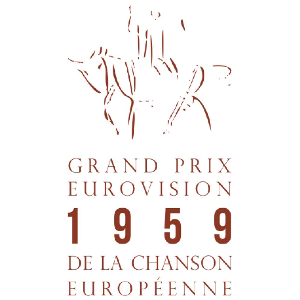
The Eurovision Song Contest 1959 was the fourth edition of the annual Eurovision Song Contest, held on Wednesday 11 March 1959 at the Palais des Festivals et des Congrès in Cannes, France, and hosted by French television presenter Jacqueline Joubert. Organised by the European Broadcasting Union (EBU) and host broadcaster Radiodiffusion-Télévision Française (RTF), the contest, originally known as the Grand Prix Eurovision de la Chanson Européenne 1959, was held in France following the country's victory at the 1958 contest with the song "Dors, mon amour", performed by André Claveau.
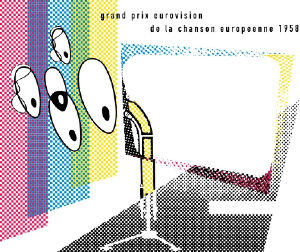
The Eurovision Song Contest 1958 was the third edition of the annual Eurovision Song Contest. Organised by the European Broadcasting Union (EBU) and host broadcaster Nederlandse Televisie Stichting (NTS), the contest, originally known as the Grand Prix Eurovision de la Chanson Européenne 1958 was held on Wednesday 12 March 1958 at the AVRO Studios in Hilversum, the Netherlands and hosted by Dutch television presenter Hannie Lips. This marked the first time that the contest was hosted in the country of the preceding year's winner, a tradition that has been continued ever since.
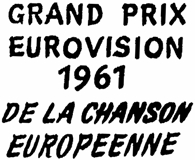
The Eurovision Song Contest 1961 was the 6th edition of the annual Eurovision Song Contest. Once again, the contest was held in the French seaside city of Cannes, having also hosted the 1959 edition. Organised by the European Broadcasting Union (EBU) and host broadcaster Radiodiffusion-Télévision Française (RTF), the contest was again held at the Palais des Festivals et des Congrès on Saturday 18 March 1961, becoming the first contest to take place on a Saturday evening, a tradition that has continued ever since. The show was directed by Marcel Cravenne and again hosted by Jacqueline Joubert, who had also hosted in 1959.
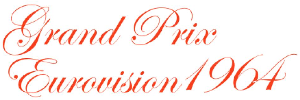
The Eurovision Song Contest 1964 was the 9th edition of the annual Eurovision Song Contest. It took place in Copenhagen, Denmark, following the country's victory at the 1963 contest with the song "Dansevise" by Grethe and Jørgen Ingmann. Organised by the European Broadcasting Union (EBU) and host broadcaster Danmarks Radio (DR), the contest was held at Tivolis Koncertsal on 21 March 1964, and was hosted by Danish TV presenter Lotte Wæver.

The Eurovision Song Contest 1965 was the tenth edition of the annual Eurovision Song Contest. It took place in Naples, Italy, following the country's victory at the 1964 contest with the song "Non ho l'età" by Gigliola Cinquetti. Organised by the European Broadcasting Union (EBU) and host broadcaster Radiotelevisione italiana (RAI), the contest was held at Sala di Concerto della RAI on 20 March 1965, and was hosted by Italian singer Renata Mauro.

The Eurovision Song Contest 1967 was the 12th edition of the annual Eurovision Song Contest. It took place in Vienna, Austria, following the country's victory at the 1966 contest with the song "Merci, Chérie" by Udo Jürgens. Organised by the European Broadcasting Union (EBU) and host broadcaster Österreichischer Rundfunk (ORF), the contest was held at the Großer Festsaal der Wiener Hofburg on 8 April 1967, becoming the first contest held in the month of April, and was hosted by Austrian actress Erica Vaal.

The Eurovision Song Contest 1989 was the 34th edition of the Eurovision Song Contest, held on 6 May 1989 in the Palais de Beaulieu in Lausanne, Switzerland. Organised by the European Broadcasting Union (EBU) and host broadcaster Télévision suisse romande (TSR) on behalf of the Swiss Broadcasting Corporation, and presented by Jacques Deschenaux and Lolita Morena, the contest was held in Switzerland following the country's victory at the 1988 contest with the song "Ne partez pas sans moi" by Céline Dion.
Germany debuted in the Eurovision Song Contest 1956, held on 24 May 1956 at the Teatro Cursaal in Lugano, Switzerland. Nord- und Westdeutscher Rundfunkverband (NWRV), on behalf of ARD, organised a national final held on 1 May 1956 to determine two German entries for the contest. The results were determined by a jury panel. The songs "Das Lied vom großen Glück" by Walter Andreas Schwarz, later known as "Im Wartesaal zum großen Glück", and "So geht das jede Nacht" by Freddy Quinn were selected to represent the nation. German entries performed fourth and eleventh, respectively, out of the 14 entries competing in the contest.
Switzerland held a national pre-selection to choose the two songs that would go to the Eurovision Song Contest 1956. It was held on 28 April 1956.

France has participated in the Eurovision Song Contest 65 times since its debut at the first contest in 1956. France is one of only seven countries to be present at the first contest, and has been absent from only two contests in its history, missing the 1974 and 1982 contests. Along with Germany, Italy, Spain, and the United Kingdom, France is one of the "Big Five" countries that are automatically prequalified for the final, due to being the largest financial contributors to the European Broadcasting Union (EBU). France has won the contest five times.

Noëlle Cordier is a French singer. She participated for France in the 1967 Eurovision Song Contest in Vienna with the song "Il doit faire beau là-bas", finishing in third place of 17 entries.
France participated at the Eurovision Song Contest 1958, held in Hilversum, Netherlands. André Claveau with the song "Dors, mon amour" was selected as the nation's entry following an internal selection as well as a national final held on 7 February 1958. At the contest, held on 12 March 1958, France won with 27 points.
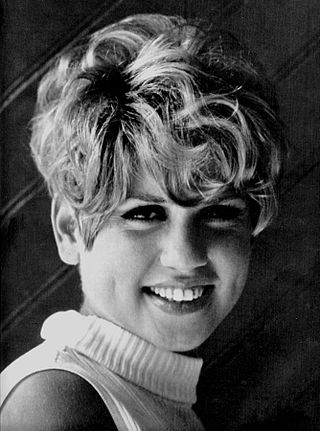
Françoise Nivot, known professionally as Marjorie Noël, was a French pop singer who had a brief career in the mid-1960s, and is best known for her participation on behalf of Monaco in the Eurovision Song Contest 1965.
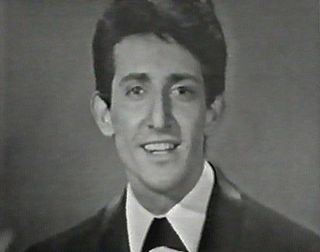
Guy Mardel is a French singer, best known for his participation in the 1965 Eurovision Song Contest.

Jean Philippe Gargantiel was a French singer who represented France at the Eurovision Song Contest 1959. He returned to the contest in 1962 representing Switzerland. He was the first artist to compete for two countries at Eurovision.
France was represented by Isabelle Aubret, with the song "Un premier amour", at the Eurovision Song Contest 1962, which took place on 18 March in Luxembourg City.
France was represented by Jean-Paul Mauric, with the song "Printemps, avril carillonne", at the Eurovision Song Contest 1961, which took place on 18 March in Cannes following Jacqueline Boyer's victory for France the previous year. For 1961, broadcaster RTF opted to hold a national final, which took place on 18 February at 21:20 CET.
Dominique Walter was a French singer. He was born in Paris and is the son of singer Michèle Arnaud. In 1966, he represented France at the Eurovision Song Contest with the song Chez Nous. At the close of voting, it had received just 1 point, placing it 16th in a field of 18 competitors. Despite its poor performance at Eurovision, the record reportedly sold 100 000 times.
The Sanremo Music Festival 1961, officially the 11th Italian Song Festival, was the eleventh annual Sanremo Music Festival, held at the Sanremo Casino in Sanremo, province of Imperia between 26 January and 6 February 1961.
The Sanremo Music Festival 1957, officially the 7th Italian Song Festival, was the seventh annual Sanremo Music Festival, held at the Sanremo Casino in Sanremo, province of Imperia between 7 and 9 February 1957. The show was presented by television presenter Nunzio Filogamo, assisted by Marisa Allasio, Fiorella Mari, Nicoletta Orsomando.











